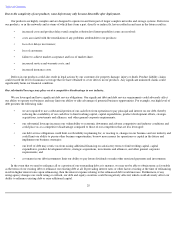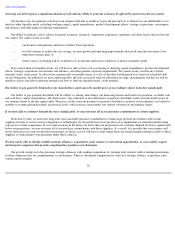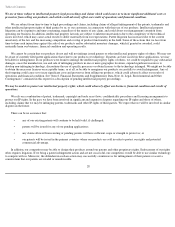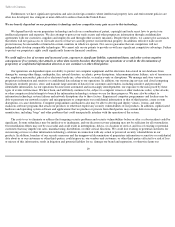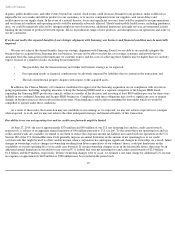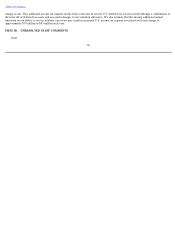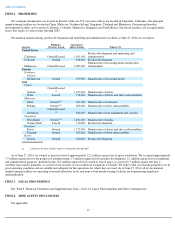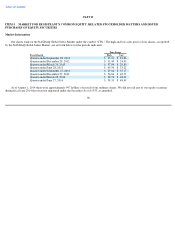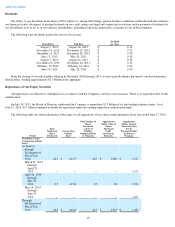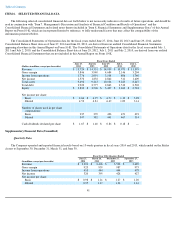Seagate 2013 Annual Report Download - page 37
Download and view the complete annual report
Please find page 37 of the 2013 Seagate annual report below. You can navigate through the pages in the report by either clicking on the pages listed below, or by using the keyword search tool below to find specific information within the annual report.
Table of Contents
Because we experience seasonality in the sales of our products, our results of operations will generally be adversely impacted during the
second half of our fiscal year.
Sales of computer systems, storage subsystems and consumer electronics tend to be seasonal, and therefore we expect to continue to
experience seasonality in our business as we respond to variations in our customers' demand for our products. In particular, we anticipate that
sales of our products will continue to be lower during the second half of our fiscal year. In the client compute and client non-compute market
applications of our disk drive business, this seasonality is partially attributable to the historical trend in our results derived from our customers'
increased sales of desktop computers, notebook computers, and consumer electronics during the back-to-
school and winter holiday season. In the
enterprise market our sales are seasonal because of the capital budgeting and purchasing cycles of our end users. Since our working capital needs
peak during periods in which we are increasing production in anticipation of orders that have not yet been received, our results of operations will
fluctuate seasonally even if the forecasted demand for our products proves accurate. Furthermore, it is difficult for us to evaluate the degree to
which this seasonality may affect our business in future periods because of the rate and unpredictability of product transitions and new product
introductions, particularly in the client non-compute market, as well as macroeconomic conditions.
The price of our ordinary shares may be volatile and could decline significantly.
The stock market, in general, and the market for technology stocks in particular, has recently experienced volatility that has often been
unrelated to the operating performance of companies. If these market or industry-based fluctuations continue, the trading price of our ordinary
shares could decline significantly independent of our actual operating performance, and you could lose all or a substantial part of your
investment. The market price of our ordinary shares could fluctuate significantly in response to several factors, including among others:
• general uncertainty in stock market conditions occasioned by global economic conditions, negative financial news and the
continued instability of several large financial institutions;
• actual or anticipated variations in our results of operations;
•
announcements of innovations, new products or significant price reductions by us or our competitors, including those competitors
who offer alternative storage technology solutions;
• our failure to meet the performance estimates of investment research analysts;
• the timing of announcements by us or our competitors of significant contracts or acquisitions;
• general stock market conditions;
• the occurrence of major catastrophic events;
• changes in financial estimates by investment research analysts;
• changes in the credit ratings of our indebtedness by rating agencies; and
• the sale of our ordinary shares held by certain equity investors or members of management.
Political events, war, terrorism, natural disasters, public health issues and other circumstances could materially adversely affect our results
of operations and financial condition.
War, terrorism, geopolitical uncertainties, natural disasters, public health issues, and other business interruptions have caused and could
cause damage or disruption to international commerce and the global economy, and thus could have a strong negative effect on our business, our
suppliers, logistics providers, manufacturing vendors and customers. Our business operations are subject to interruption by natural disasters such
as floods and earthquakes, fire, power shortages, terrorist attacks, other hostile acts, labor
34



